Are you the child of an older mother? What are the effects on children whose mothers have them “later?”
The number of births to women in their 30s and well into their 40s keeps rising; at the same time, the number of women between ages 20 and 24 who are having their first child falls. Surprisingly, the number of women having babies in their mid-forties or older, although still relatively small, has tripled in the last 20 years.
The pushback and concern about women having babies when they are older have been well documented. In spite of risks, having babies “later” is increasingly popular, signaling a trend that is more than likely to continue. Robin Gorman Newman (no relation), the founder of MotherhoodLater.com, a community, and resource for “later” moms tells me that her organization has been growing steadily since she started it in 2005. “I receive ongoing inquiries from women anticipating they may become a mom at age 35 and older seeking information and support,” she says.
Medical advances — in-vitro fertilization, egg freezing, frozen embryos, donor eggs, and surrogates — have allowed women to consider waiting to have children until they feel ready. With technology to monitor and protect both mother and fetus, many risks have been reduced. These advances also provide a “security blanket,” a cushion of sorts, for women who wait to become mothers.
CBS Sunday Morning spotlighted first-time mothers who started their families in their 40s. Some conceived naturally, others used fertility assistance. “Is 40 the new 30 for having babies?” CBS asked. These women underscore the realities of getting established and being able to have their babies when the time is right for them.
There are many benefits for mothers — and fathers — who wait until they are older. I outlined one of them for women whether single or partnered in more detail in “Want to Make More Money? Have Babies After 30.” But what are the benefits for the children of “older” mothers?
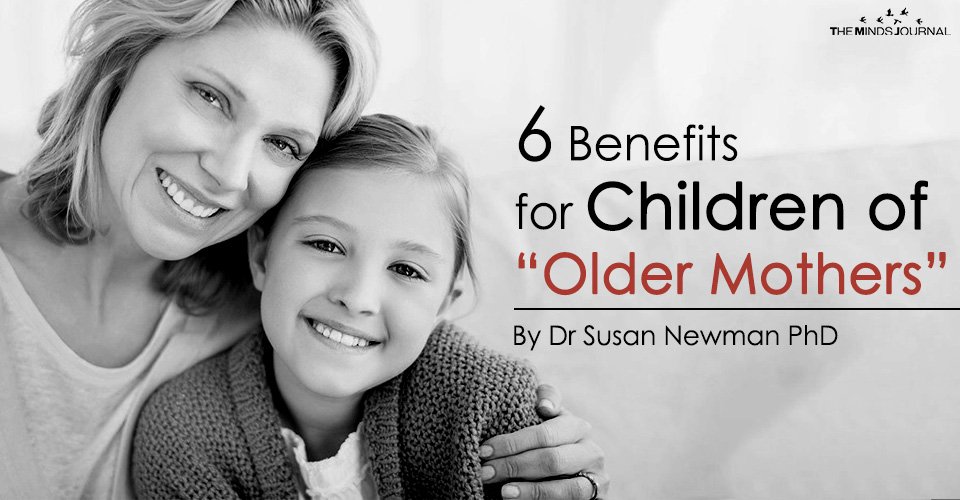
Benefits for Children of “Older Mothers”
Are you planning to have children later in life? Listen to what Janet Jackson says about pregnancy after 40
Studies in recent years counter some negative stereotypes of “older” mothers and highlight the benefits for their children.
1. Children are likely to have positive long-term outcomes.
Using data from Sweden, the study “Advanced Maternal Age and Offspring Outcomes: Reproductive Aging and Counterbalancing Period Trends” looked at how secular improvements — advancements in public health, for example — may “outweigh the disadvantages that have been shown to be associated with being born to an older mother.” They found that fertility postponement — due to such factors as more career opportunities for women and birth control — even to age 40 and beyond, “is associated with positive long-term outcomes for children.”
When the researchers analyzed data from siblings who essentially had a similar home environment, they noted that the sibling born when the mother was older was taller, stayed in the educational system longer, was more likely to attend university, and performed better on standardized tests than the siblings born when their mother was younger.
Barclay and Myrskylä wrote, “We found no substantively or statistically significant disadvantage for outcomes in adulthood for those born to older mothers, not even for those born to mothers aged 45 or older… These results are also likely to apply to other countries where health is improving and education is expanding.” Their findings were supported and augmented in several studies.
Lack of a mother’s love impacts children. Read on Ways In Which Lack Of A Mother’s Love Affects Her Daughter’s Entire Life
2. Children acquire more advanced language skills.
When Jessica Harding and her colleagues investigated “The Relationship Between Maternal Education and Children’s Academic Outcomes,” they found that because older mothers have probably stayed in school longer, they have and use more extensive vocabularies when interacting with their children, starting at very young ages. The study makes clear that enriched language skills are “a crucial component of children’s cognitive skills,” which is evident in how they perform in school. In short, “Children exposed to more enriched language environments demonstrate more advanced language abilities.”
Additionally, the researchers point out, “Mothers with higher levels of education likely have many friends and family members with high levels of education to act as role models to their children.” With a college-educated mother, a child is exposed to the kinds of nourishing influences that promote academic success.
3. Children do well academically across the board.
Harding’s study, reported in The Journal of Marriage and Family, concluded that on many levels children reap the benefits of their mothers’ education — from preschool through adolescence — on cognitive tests, achievement tests, SATs, and are more likely to go to college, a finding that replicates aspects of the Swedish study.
4. Children are on the receiving end of educational and emotional support.
Similarly, Pamela Davis-Kean from the University of Michigan found, “Parents’ education and family income influence children’s achievement indirectly through educational expectations and parenting behaviors that stimulate reading and constructive play and provide emotional support in the home.” Her study, “The Influence of Parent Education and Family Income on Child Achievement: The Indirect Role of Parental Expectations and the Home Environment” reported in the Journal of Family Psychology, looked at how specific parenting beliefs and behaviors affect a child’s development. The children were 8 to 12-year-olds.
Children mimic their parent’s behavior. So, be careful about bad parenting. Here are 11 Signs of Bad Parenting! Are You Guilty of Them?
Assessments were made on: reading — how often a child read for pleasure and how many books were in the home; parent-child play behavior, recording parent participation and interaction, including how often they played together with board games, in sports, on computers, or doing arts and crafts; and finally, parental warmth was measured by tone of voice and frequency of praise. Children’s achievement was then measured, supporting Davis-Kean’s theory that “parents’ education influences child achievement indirectly through its impact on the parents’ achievement beliefs and stimulating home behaviors.”
In summarizing the study, Davis-Kean said, “Parents’ educational attainment seems to be a major variable in children’s well-being in general.”
Parents who overvalue children are doing more damage than good. Here’s How Parents Create Narcissistic Children
5. Children are likely to receive more parental time and attention.
Like one of the women in the CBS segment, more moms who choose to start families later have made strides in or met their career goals, saved money from being in the workforce longer, or increased their earning potential before having babies. Such situations often give parents more dollars to invest in their children and provide a sense of security and stability. Adding to a child’s feeling of stability is the fact that older mothers are more likely to be married.
Older mothers — and fathers — who are less worried about their earning potential, or less pulled or stressed by their jobs, tend to be more patient and can spend more time with their offspring.
6. Older mothers are projected to live long lives, to be there for their children.
Contrary to some arguments, advances in healthcare and people’s attitudes about exercise and staying fit indicate that older mothers live a long time. A study in Menopause Journal examined older mothers’ life expectancy and found that women who had their last child after the age of 33 are likely to live to 95. In fact, researchers reported that these women had twice the chance of living to 95 or older than those who had their last child before their 30th birthday. The good news for women having babies after 40 is similar.
Parents’ longevity aside, what child wouldn’t benefit from the likely advantages? Taken as a whole, the evidence points to solid, sensible support for having babies later if that’s what you choose, or if life circumstances delay starting your family.
Written By: Susan Newman Ph.D
Originally Appeared On Psychologytoday.com
You May Also Like
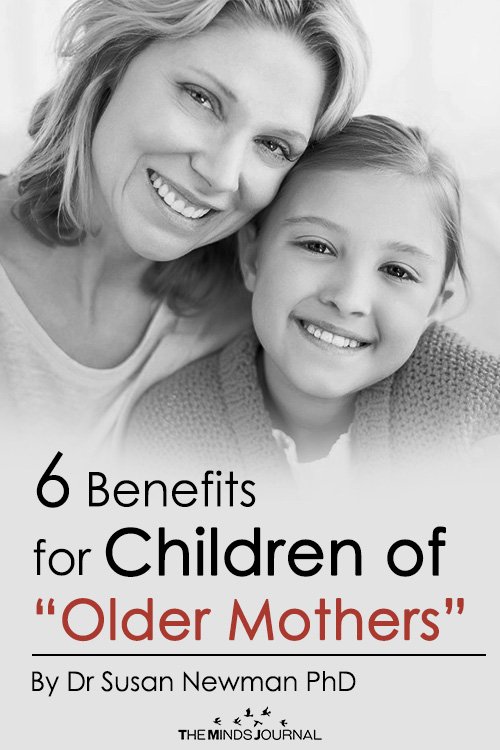
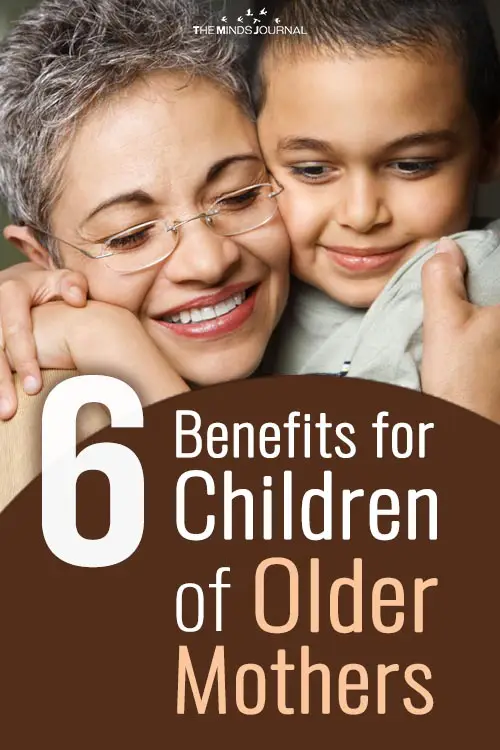
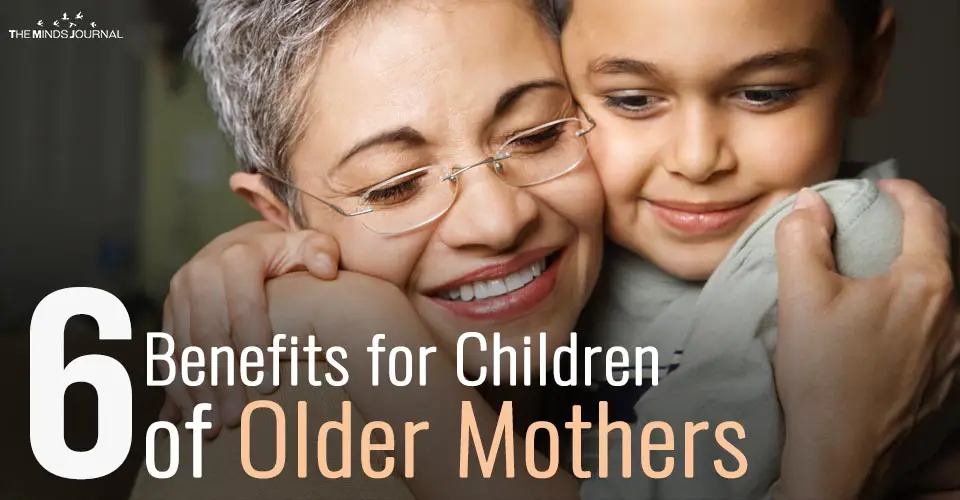




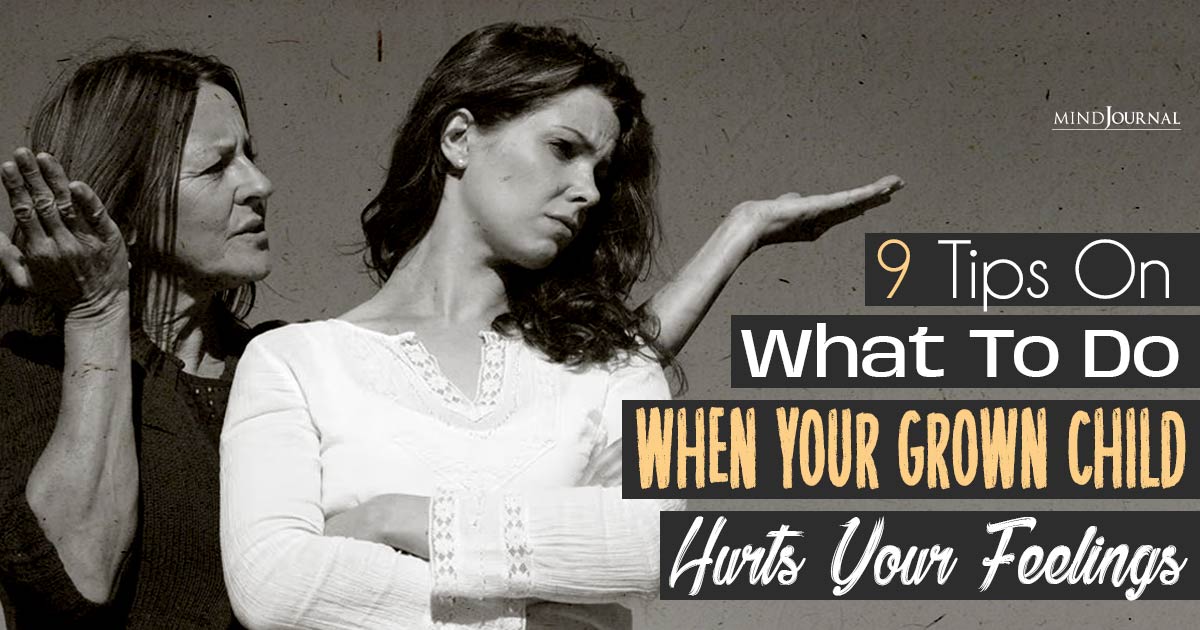
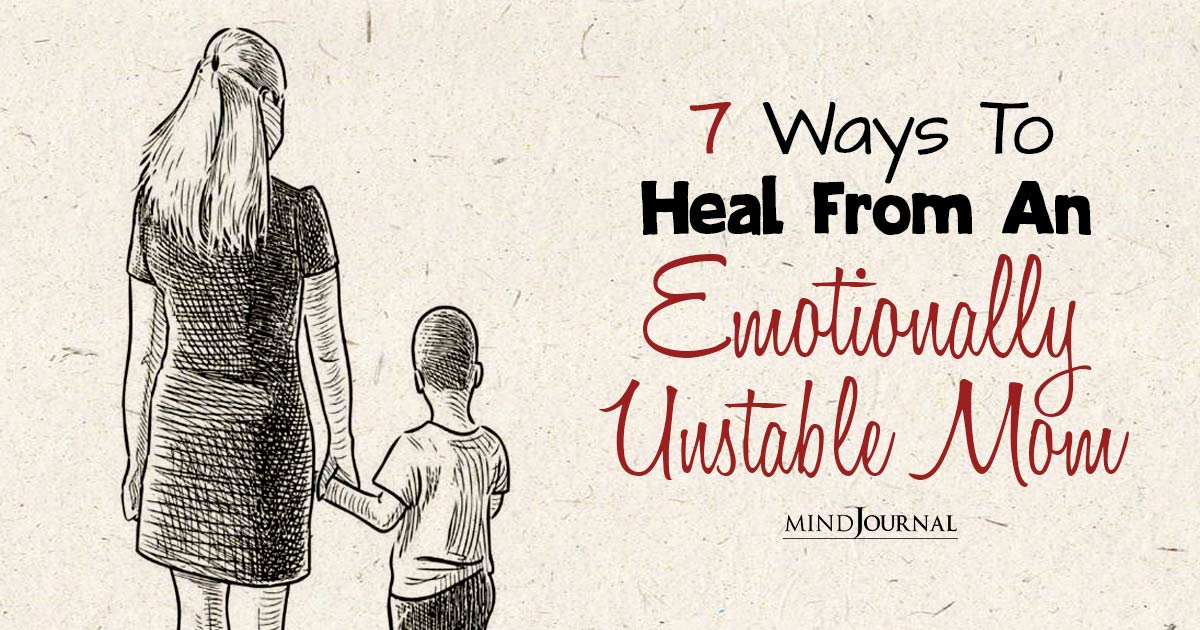

Leave a Reply
You must be logged in to post a comment.